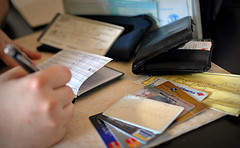Contents
- What is the “automatic stay”?
- Will bankruptcy stop calls from bill collectors, repossessions, foreclosures, evictions, lawsuits, judgments, or wage attachments?
- Can the filing of a Bankruptcy stop home foreclosures, wage garnishments, car repossession, IRS levies and DTE Utility Shut-offs?
- Can bankruptcy stop a lawsuit where someone is suing me for collection of a debt?
- Do the automatic stay provisions of the Bankruptcy Code protect money I have in the bank, or is it seized by the Bankruptcy Court?
- Can a bankruptcy be filed simply to delay a creditor with the Automatic Stay?
- How can the Automatic Stay help you?
One of the most powerful protections triggered when you file a bankruptcy petition is the automatic stay. Within seconds of me pressing a button on my computer to file a client’s bankruptcy case electronically with the bankruptcy court here in Detroit, a case number is generated. Filing a case immediately puts into effect the automatic stay which among other things, primarily prevents creditors from taking any further action against my clients in their attempts to collect their debt. This includes things like calling or sending collection letters, garnishing wages or bank accounts, starting or continuing collection lawsuits. It also includes stopping foreclosure, repossession and utility shut-offs. In some circumstances, filing a bankruptcy will stop eviction by a landlord.
What is the “automatic stay”?
The automatic stay which goes into effect when you file a bankruptcy is the court order that stops creditors immediately, even if they don’t yet know you filed bankruptcy. The automatic stay is one of the most powerful tools you as the debtor get when you file your bankruptcy petition. It is triggered automatically upon the filing of your case, either Chapter 7 or Chapter 13. This is often difficult for non-attorneys and creditors to understand as they are often looking for a court order. For example, one of the most common reasons client’s file a petition in bankruptcy is to stop an existing wage garnishment. When my office files a case, we contact our client’s payroll department to notify them of the filing and provide proof that the case is filed with an official notice. Commonly, the payroll or human recourse person will ask for a court order in addition to the bankruptcy notice. I then explain to them how the automatic stay works and they will stop the garnishment. The automatic stay is a very powerful tool in the bankruptcy lawyer’s tool belt. I have even had the repo man return a car that he took from my client, because a bankruptcy had been filed, even though the repo man did not know about it until after I spoke with him.
Most creditors who are regularly in the business of lending money know and respect the power of the automatic stay in bankruptcy and will abide by the law. The automatic stay is an automatic injunction against most continued collection activities. The automatic stay goes into effect as soon as your bankruptcy case is filed with the bankruptcy court. The automatic stay is important because it protects you from continued harassment from your creditors. The automatic stay applies to virtually everyone and stops virtually all activities that are mechanisms to collect money from you, or make it uncomfortable or embarrassing on you so that you want to pay.  It stops everyone who is attempting to collect a debt except for criminal courts demanding fines or restitution. It does not stop child support. It does not get you out of spousal support obligations such as alimony. It does not stop you for being arrested for not paying a criminal fine or restitution. It does not give you criminal immunity. The automatic stay is “automatic”. The automatic stay goes into effect immediately upon the filing of your bankruptcy petition. In a Chapter 13 Bankruptcy, the automatic stay can even go so far as to protect your co-signers and co-debtors in bankruptcy.
It stops everyone who is attempting to collect a debt except for criminal courts demanding fines or restitution. It does not stop child support. It does not get you out of spousal support obligations such as alimony. It does not stop you for being arrested for not paying a criminal fine or restitution. It does not give you criminal immunity. The automatic stay is “automatic”. The automatic stay goes into effect immediately upon the filing of your bankruptcy petition. In a Chapter 13 Bankruptcy, the automatic stay can even go so far as to protect your co-signers and co-debtors in bankruptcy.
Will bankruptcy stop calls from bill collectors, repossessions, foreclosures, evictions, lawsuits, judgments, or wage attachments?
Yes. Under the “automatic stay” in bankruptcy, ALL collection efforts by creditors must immediately stop. Often, when I file a bankruptcy petition for a client, they are facing immediate creditor action such as a wage garnishment, bank levy, imminent vehicle repossession, home foreclosure or pending utility shut-off. When I file the bankruptcy case for one of my clients, the court generates an official bankruptcy notice within seconds of filing. As a courtesy to my clients who are facing such aggressive creditor action, my office will send a fax or email to the creditor or their attorneys as well as my client’s payroll department or bank to make sure that the impending action will stop. The bankruptcy court clerk typically will mail out the official notice of commencement of bankruptcy filing to the creditors listed in my client’s bankruptcy petition, but this usually takes a couple of days. Rather than wait for the court clerk to mail out the notices, my office will send notice to these creditors shortly after filing.
Can the filing of a Bankruptcy stop home foreclosures, wage garnishments, car repossession, IRS levies and DTE Utility Shut-offs?
Yes, absolutely. These are all some of the most common reasons my office files bankruptcy petitions on behalf of our clients.
Can bankruptcy stop a lawsuit where someone is suing me for collection of a debt?
Yes, again this is a very common reason for filing a bankruptcy petition. It is important to stress that it is never too late in the process to file a bankruptcy to stop a creditor who is suing you for the collection of a debt. The bankruptcy will stop the creditor in the earliest of stages such as when you receive a summons and complaint or are served with a lawsuit by a process server all the way up to a creditor who has already received a judgment against you and has been garnishing your wages or intercepting your income tax refunds for years. I feel that it is important to stress this fact because many of my clients mistakenly believe that if a creditor already has a judgment that bankruptcy will not help them or that it is somehow too late. This is not true. Bankruptcy is a federal law provided for in the United States Constitution and basically is more powerful than the lower State of Michigan Circuit or District court in which the creditor filed the lawsuit or obtained their judgment.
That is why when the automatic stay is invoked by the filing of your bankruptcy petition, the lower State court judgment is “stayed” or stopped or put on hold during the bankruptcy.  And a few months later (in the case of a Chapter 7 bankruptcy filing), when my client receives their Bankruptcy Discharge Order, the creditor will deem the judgment void against my client and uncollectible. As you can see, the automatic stay is a very powerful tool that can stop a creditor lawsuit dead in its tracks, but keep in mind, it does not stop criminal cases (where you may be charges with a crime such as drunk driving or embezzlement) or criminal restitution (where a court orders you to repay a victim of a crime for their losses. Criminal restitution is non-dischargeable in bankruptcy, meaning you cannot wipe it out.
And a few months later (in the case of a Chapter 7 bankruptcy filing), when my client receives their Bankruptcy Discharge Order, the creditor will deem the judgment void against my client and uncollectible. As you can see, the automatic stay is a very powerful tool that can stop a creditor lawsuit dead in its tracks, but keep in mind, it does not stop criminal cases (where you may be charges with a crime such as drunk driving or embezzlement) or criminal restitution (where a court orders you to repay a victim of a crime for their losses. Criminal restitution is non-dischargeable in bankruptcy, meaning you cannot wipe it out.
Do the automatic stay provisions of the Bankruptcy Code protect money I have in the bank, or is it seized by the Bankruptcy Court?
In the vast majority of the bankruptcy cases I file on behalf of my clients, no assets are taken to pay creditors. This is because in Michigan where I practice, debtors have a choice between using the State exemptions or the Federal exemptions to protect their assets in bankruptcy. In roughly 99% of my cases, the Federal exemptions are chosen due to the fact that the exemptions cover a wider range of assets and provide for a “wildcard” exemption which can be very useful for protecting cash on hand and money in the bank at the time of filing. Money in checking or savings accounts may or may not be taken by the trustee, depending on the bankruptcy exemptions claimed and of course the amount in the accounts. Ordinarily, the trustee is the only party that can seize your account once you have filed your bankruptcy case with the court; however, there is one important exception. If you have an account in a bank, credit union, savings and loan or other financial institution to which you also owe money, that institution may refuse to release account funds to you once you have filed bankruptcy. This right of set-off is most commonly used by local credit unions where you may be a member. This is a very important and often overlooked aspect that must be considered prior to filing. In this scenario, if my client wishes to wipe out or discharge the debt they owe the credit union, I will advise them to close their accounts after withdrawing as much money as possible while at the same time stopping any direct deposit they may have with that institution.
Can a bankruptcy be filed simply to delay a creditor with the Automatic Stay?
Though some debtors do this, it is an improper purpose for filing a petition. A Bankruptcy petition should only be filed in good faith, not simply to frustrate a creditor. A bankruptcy judge could impose monetary fines and sanctions for filing a bankruptcy petition in bad faith with no intent to follow through to discharge.
How can the Automatic Stay help you?
As you can see, the automatic stay that goes into effect the moment a bankruptcy case is filed is very powerful as it stops creditors in their tracks and renders any actions taken by creditors after the stay is in effect null and void. If you have creditors taking aggressive collection actions such as starting lawsuits, garnishments, repossessions or court ordered seizures of assets, foreclosures, bank levies and the like, please do not hesitate to call my office for a free consultation to determine if a personal bankruptcy filing can help you. I am confident that I can find a solution to any creditor harassment you may be experiencing at this time. Same day appointments available! Contact us online, or call Walter at 313-962-4656 or email me at detroitbankruptcylawyer@gmail.com
.




